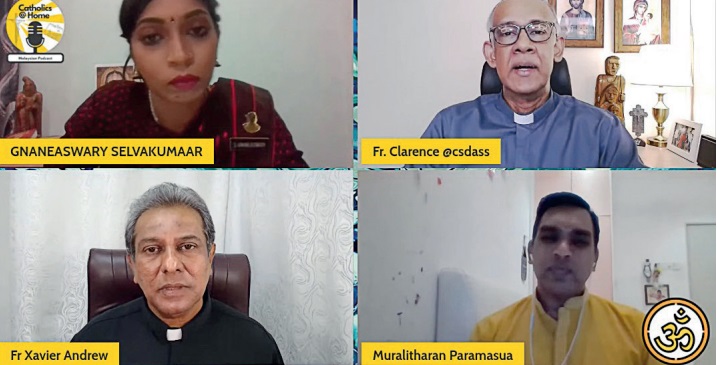Interreligious conversations help build bridges and promote peace
Aimed at fostering harmony and unity, the 90-minute informative session was held on Sept 7 with guest speakers, Gnaneaswary Selvakumaar, Head of Religious Department, Malaysia Hindu Sangam, Banting local council, and Muralitharan Paramasua, Head of Religious Bureau, Malaysia Hindu Sangam, Selangor.
Sep 18, 2021

By Gwen Manickam
Hinduism, one of the oldest religions in the world, was the topic of the latest in the series of conversations on Understanding World Religions organised by the Archdiocesan Ministry of Ecumenical and Interreligious Affairs (AMEIA), in collaboration with the Catholics@Home Podcast.
Aimed at fostering harmony and unity, the 90-minute informative session was held on Sept 7 with guest speakers, Gnaneaswary Selvakumaar, Head of Religious Department, Malaysia Hindu Sangam, Banting local council, and Muralitharan Paramasua, Head of Religious Bureau, Malaysia Hindu Sangam, Selangor.
Fr Dr Clarence Devadass, the moderator, weighed in on comments posted by the faithful questioning the need to engage in conversations like this instead of spreading the Gospel. “We need to bear in mind that we live in an environment where we relate with everyone, and the Gospel is the Good News, and the Good News is shared with everyone. These conversations help build bridges and promote peace, respect and harmony amongst everyone.
“Good relations are also a prerequisite and foundation for the Good News,” said the Director of Catholic Research Centre.
Hinduism, founded nearly 8,000 years ago, is not an organised religion. Neither does it have a systematic approach to teaching its values nor a set of rules to impart across the board, shared Muralitharan.
However, there are several common principles, including the belief in a one true god and supreme being – Brahma, who is formless, allinclusive, and eternal. Brahma is not an abstract concept but a real entity that encompasses everything.
The Vedas, meaning “knowledge,” are the oldest texts of Hinduism and are believed to be timeless, and the ultimate authority on the Hindu religion. The third-largest religion after Christianity and Islam, Hinduism also adheres to certain concepts such as truth, dharma and karma.
Followers of the faith also believe that individual souls are immortal. While the soul may take a different journey, it cannot be destroyed, and the aim is to attain Moksha or freedom.
Gnaneaswary said some misconceptions about Hinduism are that it isn’t a relevant religion. However, it is believed that Hinduism has had an impact on the world as it appears to have helped shape policies of various mediums of spirituality.
Boasting over one billion followers, Hinduism is not a polytheistic religion as assumed by many. Hindus do not worship 330 million gods but are encouraged to relate to God in ways that suit them best, including praying to many deities, believed to be manifestations of God. Its three main deities or Trimurti are the creator — Brahma, the preserver — Vishnu, and the destroyer — Shiva.
The religion does not endorse the caste system, once created by wealthy, upper-caste priests who intended to create a social hierarchy structure.
On the topic of youth and their interest or commitment to religion and its practices, Muralitharan said it remains a challenge. Today’s younger generation are more mature and tend to question the fundamentals of religion. They ask questions like ‘Why do I have to go to the temple, why can’t I pray at home?’, ‘Why do I have to be a vegetarian?’ compared to the older generation who were more accepting of their elder’s guidance and instructions.
“We need to approach the youth with logic and scientific explanation or they take a step back from religion,” said Muralitharan.
To view this webinar, go to: https://youtu.be/Fr-S7T3puiY







Total Comments:0